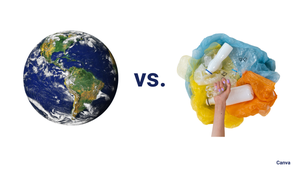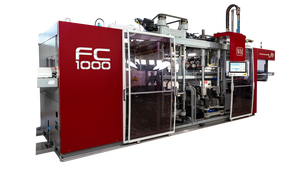Three extrusion-related products are covered in this Product Watch segment. First, Norwegian plastic pipe processor Pipelife Norge has placed an order for one of the world's largest large-diameter pipe extrusion lines, to produce polyolefin pipes with diameters up to 2500 mm at its plant in Stathelle.
June 14, 2011
The line is on order from extrusion systems supplier battenfeld-cincinnati (Vienna, Austria and Bad Oeynhausen, Germany). Pipelife Norge claims to be the only company worldwide to produce pipe segments with lengths up to 600m for offshore applications. For this purpose, the pipes are extruded directly into the sea, then bundled and towed to where they will be installation. The long segments help keep transport and installation costs low, reduce the risk of damage to the pipes in transit, and simplify installation of the pipe with only very few welded joints.
The line now on order from battenfeld-cincinnati extends upwards the size of pipe the processor will be able to extrude. The line is equipped with a 120mm single-screw extruder capable of plasticizing up to 2200 kg of resin/hr. The processing machine comes with an anti-wear coated barrel-and-screw combination, a maintenance-free AC drive and can be set and monitored via an integrated control system in the extruder.
Pipelife Norge has chosen several die change sets capable of producing pipes with a wide range of diameters from 1200 - 2500 mm and with wall thicknesses ranging from 48 - 96 mm. Also custom-made for the Norwegian application is the haul-off system, which battenfeld-cincinnati will deliver together with the extruder and main extrusion die at the end of this year. The caterpillar haul-off, also a customized product, is equipped with 14 caterpillars, each with its own drive. The haul-off comes with special safety gates, which allow access for servicing and adjustments of settings during production.
The Pipelife facility in Stathelle, where the new 2500 mm pipe extrusion line will be installed.
From Swiss gear pump manufacturer Maag comes the new therminox-V. This new piece of kit gives processors of ethylene propylene diene monomer (EPDM) films a laboratory-scale solution to help them develop and optimize recipes and processing of these films on a small scale before being "tuned" for new large-series applications.
EPDM films continue to find favor in building and construction applications especially, for use as sealing webs, for example. These sealing webs are primarily used to seal flat roofs, back-ventilated facades and ponds. Sealing webs made from EPDM can stretch up to 500% and are permanently elastic, even in extreme temperature fluctuations between -40°C to +120°C.
Maag Pump Systems already makes and markets gear pumps for commercial-scale EPDM film processing.
Meanwhile, last month more than 80 processors made their way to Ashaway, RI for the open house of extrusion systems manufacturer American Kuhne. Among highlights of the event was the processing of medical tubing at speeds of up to 830 ft/min, using an alternative to PVC, the Medalist medical-grade elastomer supplied by plastics compounder Teknor Apex (Pawtucket, also RI).
The tubing processed had a 0.105 in. (2.67mm) OD x 0.020 in. (0.508mm) wall thickness. At a line speed of 600 ft/min (183 ft/min), tolerances of +/- 0.0004 in. on the OD and +/- 0.0001 in. on the wall thickness were held. The extrusion system consisted of an American Kuhne ULTRA series 2.0 in. (50mm) extruder with inline spiral flow die head; Conair multi-pass vacuum tank with servo driven wheel to minimize the rubber band effect and to minimize tension within the process; servo driven nip roller puller; automatic cut and transfer coiler, and a Zumbach ID/OD/WALL tube measurement system with closed-loop control of the OD and wall thickness.
The compound used in this run was MD-585, an 83 Shore A compound for tubing applications. The material provides mechanical properties equal to or better than those of the flexible PVC widely used for medical tubing, and yields tubing that looks and handles like PVC. Medalist elastomers are substantially more flexible than PVC and also less dense.
About the Author(s)
You May Also Like


